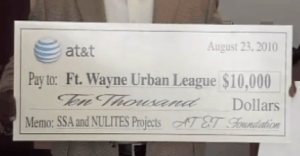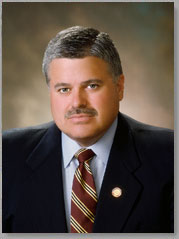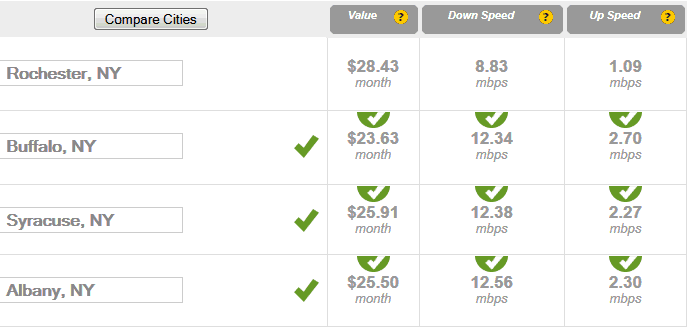Federal Communications Chairman Julius Genachowski is racking up those frequent flier miles as he travels from one telecom industry trade show to another. In addition to less-than-thrilling appearances at industry events run by the wireless industry and broadcasters, the chairman is now scheduled to be the headline act at the cable industry trade show to be held June 15 in Chicago.
Instead of devoting time and attention to provider profiteering and the ongoing concentration of the wireless marketplace, Genachowski will be shaking hands with big cable executives, sharing the stage with former FCC chairman Michael Powell, who now runs the National Cable and Telecommunications Association. (Powell is a classic example of Revolving Door Syndrome: Start a career in public service and finish it using your government connections to cash in with a six figure salary working for the industry you used to oversee.)
While the current FCC chairman gets to bloat his expense account, his performance on behalf of the American people leaves plenty to be desired:
- His vision of our broadband future is all talk and little action, with National Broadband Plan goals seen as increasingly anemic when contrasted with broadband development abroad;
- Genachowski has caved on important consumer protections for broadband consumers, most notably with a very-industry-friendly Net Neutrality policy that won him little thanks (Verizon sued anyway);
- His “white space” broadband plan to carve up UHF broadcast spectrum for mobile broadband comes poorly conceived, infuriating broadcasters who promise to spend millions in a lobbying death match;

Julius Genachowski has plenty of time for speeches, but never enough time to protect consumers who want better broadband, more competition, and lower prices..
At the NCTA convention, Genachowski is likely to deal with the hot potato retransmission consent issue — the one that pits you in the middle of million-dollar squabbles over what pay TV provider gets to carry what networks (and how much you will pay for them). Also on the agenda: CableCARD 2: Electric Boogaloo, also known as AllVid, the almost certainly Dead on Arrival replacement for the first generation CableCARD set top box replacement that practically nob0dy uses.
Although Google loves AllVid, the powerful entertainment and cable industry is less impressed. The Motion Picture Association of America considers it a piracy gateway because it lacks sufficient copyright protection mechanisms, and the cable industry has always been wary of standardized set top equipment that could tie down on-demand programming, signal theft protection, and future innovations.
Genachowski is sure to get a warmer reception at the cable show than he got from broadcasters earlier this month, who were downright hostile over his proposal to carve up the UHF TV dial (channels 14-51), selling off “extra” channels for wireless broadband.
The National Association of Broadcasters is starting to get a little worried, not feeling the love the Commission has bestowed on big cable and phone companies who got their lobbying wish-lists largely granted. Instead, a year after being dragged into an expensive digital TV conversion, the FCC is back for more from television broadcasters, taking back perhaps a dozen or more channels for “white space broadband,” a vaguely-explained plan to enhance the amount of space available for wireless data.
Unfortunately, with thousands of television stations, the FCC will have to find enough channels for everyone to share without interfering with each other. The FCC still hasn’t released a definitive plan about how to accomplish this, and with big wireless interests suggesting TV stations should slash their transmitter power and share the same or adjacent channels, a lot of stations fear they will be crammed together like a Japanese train at rush hour.
But the wireless industry wants it, even if it drives some stations in densely populated areas off the air completely. In many other areas, especially in the northeast and southern California, stations might have to cut their signal coverage areas to avoid interfering with stations sharing the same channel in an adjacent city. Rural residents relying on over the air television could be out of luck, even with a rooftop antenna.
In a bidding war, who would likely win the spectrum up for sale? AT&T, Verizon, and perhaps some large cable companies looking for enhanced wireless services to sell. No wonder the NAB is worried. The FCC could favor selling spectrum out from under your local stations and sell it to their biggest competitors in the pay television business.
Consumers should be concerned as well. Should today’s biggest wireless carriers scoop up “white space” frequencies, it will do nothing to bring enhanced competition or lower prices. It will just lock up even more spectrum for a wireless industry that threatens to become a duopoly.
Instead of flying all over the country to attend trade shows and shake hands with industry leaders, Chairman Genachowski should be spending more of his time looking for creative, effective solutions to enhance competition and protect consumers, not simply throw them under the bus for the benefit of a handful of industry players already too large for the common good.


 Subscribe
Subscribe









